[ad_1]
A therapy of increasing amounts of grocery store peanut butter helps kids who can already tolerate the equivalent of at least half a peanut achieve significantly greater and longer-lasting desensitization compared with counterparts who avoided peanuts, according to new data published on Febuary 10 in NEJM Evidence.
“Our data show that treatment of children 4-14 years of age who had a high baseline threshold of peanut allergy were able to safely ingest serving-size amounts of peanuts following treatment with low-cost, supermarket-purchased products,” wrote the authors, led by Scott Sicherer, MD, director of the Elliot and Roslyn Jaffe Food Allergy Institute at Mount Sinai Kravis Children’s Hospital in New York.
The most common approach to a food allergy is avoidance, but in recent years peanut oral immunotherapy — gradually increasing amounts of pharmaceutical-grade peanut protein under medical supervision — has become an option for more with peanut allergy.
However, studies that led to the US Food and Drug Administration (FDA) approval of an injected biologic and oral peanut immunotherapy have focused on severely allergic patients who can tolerate only half a peanut or less. Authors of this new study point out there are an estimated 800,000 children in the United States. with high-threshold peanut allergy who might benefit from the treatment strategy in the study.
Significant Improvement Over Avoidance
Of 73 participants, 38 were randomized to peanut oral immunotherapy (P-OIT) and 35 to avoidance. Thirty two of 38 participants in the peanut butter group (84.2%) and 30 of 35 in the avoidance group (85.7%) underwent the primary outcome food challenge. The primary analysis showed 100% success for ingestion vs 21.0% for avoidance (between-group difference, 79.0 percentage points; 95% CI, 64.6 to 93.5; P
In the intention-to-treat analysis, sustained unresponsiveness occurred in 68.4% on P-OIT vs 8.6% tolerating 9043 mg among those avoiding (between-group difference, 59.9 percentage points; 95% CI, 42.4-77.3). No dosing reactions were greater than grade 1, and no serious adverse events were reported.
Of the six who withdrew from the peanut butter group, one withdrew because of dose-related symptoms (nausea and stomach discomfort), and the others withdrew because of anxiety, distaste, scheduling conflicts, relocation, and withdrawal by parent.
Lasting Effects After Abstinence
In a test to see whether treatment response was long lasting, children in the peanut-ingestion group who could tolerate 9 grams of peanut butter during the feeding test went on to consume at least two tablespoons of peanut butter weekly for 16 weeks and then avoided peanuts entirely for 8 weeks. Twenty six of the 30 treated children who participated in a final feeding test after the 8-week abstinence continued to tolerate 9 grams [about three tablespoons] of peanut butter, “indicating that they had achieved sustained unresponsiveness to peanuts,” the authors wrote in a press release. “The three participants from the avoidance group who could eat 9 grams of peanut protein without reaction at the earlier food test were considered to have developed natural tolerance to peanuts.”
Antonella Cianferoni, MD, PhD, an assistant professor of pediatrics at The Children’s Hospital of Philadelphia, Pennsylvania, said the study is further proof that oral immunotherapy can help some children safely reintroduce foods.
The difference in this study, she noted, is that the researchers used commercially available peanut butter instead of peanut protein approved by the FDA.
She points out these were also children with mild allergy and this therapy should be tested only under strict medical supervision.
Cianferoni highlighted that even after kids stopped eating the peanut butter for 2 months they were able to maintain their ability to reintroduce the food safely. “With oral immunotherapy, one of the limitations is that once you stop eating the food, you may revert” to intolerance, she said.
Food choice is important to children and families, Cianferoni said. “We have found over the years that patients really want to be able to eat the food. It’s not enough to be protected from accidental exposure.”
Sicherer is a deputy editor with the American Academy of Allergy, Asthma and Immunology; his institution receives grant support from Pfizer, and he is an author/editor with UpToDate. Cianferoni reported no relevant financial relationships.
[ad_2]
Source link : https://www.medscape.com/viewarticle/increasing-increments-peanut-butter-can-help-kids-mild-2025a10003rb?src=rss
Author :
Publish date : 2025-02-13 09:46:28
Copyright for syndicated content belongs to the linked Source.
